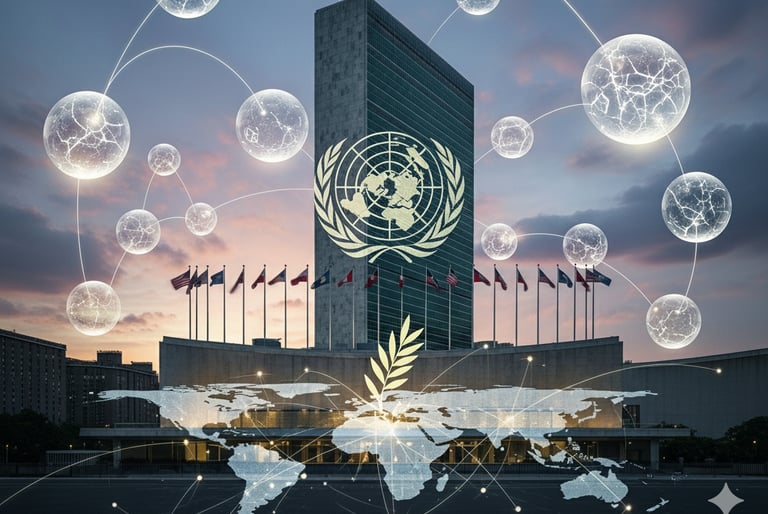Beyond the US-China Rivalry: India's Strategic Autonomy in a Multipolar World
Navigating the Global Power Shift
The global stage is often presented as a grand theatre dominated by the US-China rivalry, a clash of titans vying for economic, technological, and geopolitical supremacy. Yet, beneath this seemingly binary narrative, a more complex and multipolar world order is rapidly taking shape. At the heart of this transformation lies India, a civilization with millennia of history, the world's largest functional democracy, and a foreign policy deeply rooted in strategic autonomy.
For decades, India has carefully navigated the intricate currents of international relations, refusing to be drawn into rigid alliances. This isn't merely fence-sitting; it's a deliberate and pragmatic approach that acknowledges the complexities of a globalized world. India understands that its interests are best served by maintaining robust relationships with a diverse range of partners, rather than aligning exclusively with one power bloc.
The Balancing Act: US, China, and Russia
India's strategic balancing act is perhaps best exemplified by its relationships with the US, China, and Russia. With the United States, India has forged a comprehensive global strategic partnership, underpinned by growing defense cooperation, increasing trade, and a shared commitment to democratic values. This partnership is vital for India's technological advancements and its security in the Indo-Pacific.
Simultaneously, India maintains a historically deep and enduring relationship with Russia, a crucial partner for defense equipment and energy supplies. Despite global pressures, India has consistently upheld this relationship, demonstrating its independent foreign policy choices. This isn't about endorsing actions but about safeguarding long-term national interests and recognizing historical ties.
Then there's China, a geographical neighbor and an economic powerhouse with whom India shares a complex and often challenging relationship. The fact that India and China together represent the vast majority of humanity, and both are ancient civilizations with rich histories, adds layers of complexity. While border disputes and geopolitical competition are undeniable, economic interdependence remains significant. India's approach here is one of constructive engagement where possible, coupled with firm protection of its sovereignty and interests. This dynamic engagement, often marked by both cooperation and competition, is a testament to India's strategic agility.
Leveraging Multilateral Forums: Quad, SCO, and BRICS
India's commitment to a multipolar world is not just about bilateral relations; it's also about actively shaping global governance through multilateral forums.
The Quad (Quadrilateral Security Dialogue), comprising India, the US, Japan, and Australia, is a key platform for cooperation in the Indo-Pacific. While often perceived as a counter to China, India views the Quad as a mechanism to promote a free, open, and inclusive Indo-Pacific, emphasizing shared values and addressing common challenges like maritime security, disaster relief, and vaccine distribution.
On the other hand, India is also a prominent member of the Shanghai Cooperation Organization (SCO) and BRICS (Brazil, Russia, India, China, South Africa). These groupings, often seen as challenging the Western-dominated order, provide India with platforms to engage with Russia, China, and other emerging economies. India uses these forums to advocate for greater representation of the Global South, push for reforms in international financial institutions, and discuss issues of regional security and economic cooperation. This simultaneous engagement across diverse groupings highlights India's unique position and its ability to bridge divides.
The Diminishing Role of the UN and India's Vision
In this evolving global landscape, the United Nations, once envisioned as the bedrock of international order, faces a diminishing role in effectively shaping global events. The limitations of its structures, particularly the Security Council, often lead to stalemates and an inability to address pressing global crises decisively. This reality further underscores the importance of emerging powers like India in forging new pathways for international cooperation.
India, as the world's largest functional democracy, believes in a rules-based international order, but one that is more representative and equitable. Its foreign policy is geared towards creating a new global order where diverse voices are heard, where power is diffused, and where solutions are collaboratively crafted. This vision is not just aspirational; it is actively being pursued through India's proactive engagement on multiple fronts.
As the world moves beyond the simplistic US-China rivalry, India stands as a pivotal player, demonstrating that strategic autonomy and multilateral engagement are not just viable, but essential, for shaping a truly multipolar and more balanced global order.


